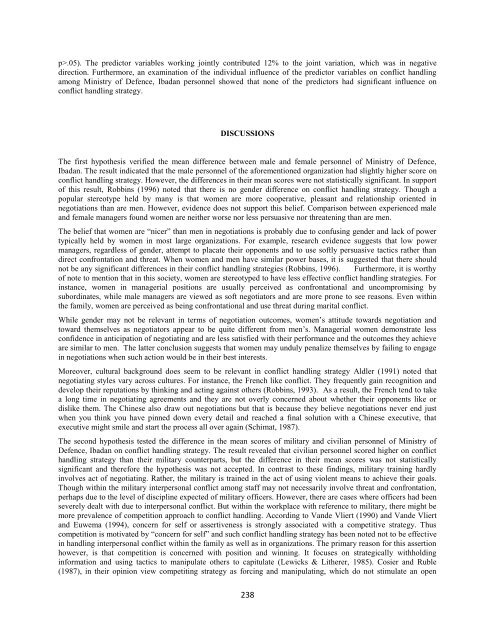Download complate issue - Ozean Publications
Download complate issue - Ozean Publications
Download complate issue - Ozean Publications
You also want an ePaper? Increase the reach of your titles
YUMPU automatically turns print PDFs into web optimized ePapers that Google loves.
p>.05). The predictor variables working jointly contributed 12% to the joint variation, which was in negativedirection. Furthermore, an examination of the individual influence of the predictor variables on conflict handlingamong Ministry of Defence, Ibadan personnel showed that none of the predictors had significant influence onconflict handling strategy.DISCUSSIONSThe first hypothesis verified the mean difference between male and female personnel of Ministry of Defence,Ibadan. The result indicated that the male personnel of the aforementioned organization had slightly higher score onconflict handling strategy. However, the differences in their mean scores were not statistically significant. In supportof this result, Robbins (1996) noted that there is no gender difference on conflict handling strategy. Though apopular stereotype held by many is that women are more cooperative, pleasant and relationship oriented innegotiations than are men. However, evidence does not support this belief. Comparison between experienced maleand female managers found women are neither worse nor less persuasive nor threatening than are men.The belief that women are “nicer” than men in negotiations is probably due to confusing gender and lack of powertypically held by women in most large organizations. For example, research evidence suggests that low powermanagers, regardless of gender, attempt to placate their opponents and to use softly persuasive tactics rather thandirect confrontation and threat. When women and men have similar power bases, it is suggested that there shouldnot be any significant differences in their conflict handling strategies (Robbins, 1996). Furthermore, it is worthyof note to mention that in this society, women are stereotyped to have less effective conflict handling strategies. Forinstance, women in managerial positions are usually perceived as confrontational and uncompromising bysubordinates, while male managers are viewed as soft negotiators and are more prone to see reasons. Even withinthe family, women are perceived as being confrontational and use threat during marital conflict.While gender may not be relevant in terms of negotiation outcomes, women‟s attitude towards negotiation andtoward themselves as negotiators appear to be quite different from men‟s. Managerial women demonstrate lessconfidence in anticipation of negotiating and are less satisfied with their performance and the outcomes they achieveare similar to men. The latter conclusion suggests that women may unduly penalize themselves by failing to engagein negotiations when such action would be in their best interests.Moreover, cultural background does seem to be relevant in conflict handling strategy Aldler (1991) noted thatnegotiating styles vary across cultures. For instance, the French like conflict. They frequently gain recognition anddevelop their reputations by thinking and acting against others (Robbins, 1993). As a result, the French tend to takea long time in negotiating agreements and they are not overly concerned about whether their opponents like ordislike them. The Chinese also draw out negotiations but that is because they believe negotiations never end justwhen you think you have pinned down every detail and reached a final solution with a Chinese executive, thatexecutive might smile and start the process all over again (Schimat, 1987).The second hypothesis tested the difference in the mean scores of military and civilian personnel of Ministry ofDefence, Ibadan on conflict handling strategy. The result revealed that civilian personnel scored higher on conflicthandling strategy than their military counterparts, but the difference in their mean scores was not statisticallysignificant and therefore the hypothesis was not accepted. In contrast to these findings, military training hardlyinvolves act of negotiating. Rather, the military is trained in the act of using violent means to achieve their goals.Though within the military interpersonal conflict among staff may not necessarily involve threat and confrontation,perhaps due to the level of discipline expected of military officers. However, there are cases where officers had beenseverely dealt with due to interpersonal conflict. But within the workplace with reference to military, there might bemore prevalence of competition approach to conflict handling. According to Vande Vliert (1990) and Vande Vliertand Euwema (1994), concern for self or assertiveness is strongly associated with a competitive strategy. Thuscompetition is motivated by “concern for self” and such conflict handling strategy has been noted not to be effectivein handling interpersonal conflict within the family as well as in organizations. The primary reason for this assertionhowever, is that competition is concerned with position and winning. It focuses on strategically withholdinginformation and using tactics to manipulate others to capitulate (Lewicks & Litherer, 1985). Cosier and Ruble(1987), in their opinion view competiting strategy as forcing and manipulating, which do not stimulate an open238
















